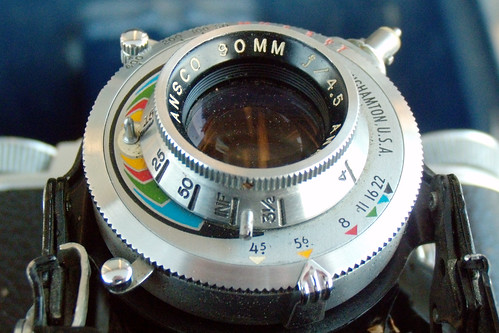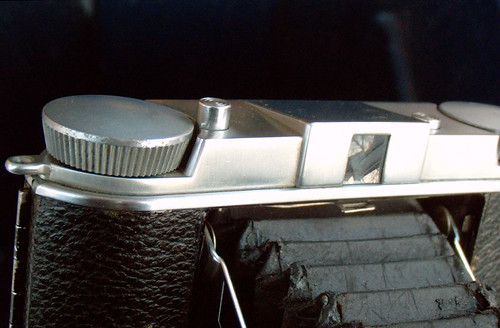Difference between revisions of "Ansco Titan"
(rewrote after aquiring this model, added period refs) |
m (stray bracket) |
||
| Line 1: | Line 1: | ||
| − | [[Ansco]] introduced this nicely-finished 6x6 folder for 120 film in the latter half of 1948<ref name= "wards">[http://www.flickr.com/photos/camerawiki/5518684882/ Ansco Titan catalog description] in [http://www.flickr.com/photos/camerawiki/5518683656/ 1948 Montgomery Ward Photographic Catalog] notes "Do not order before July 15th." </ref>. While generally similar to the Ansco Standard Speedex & Speedex 6.3, this was decidedly an upmarket model: Advertised alongside other folders costing USD $20 to $50, its $96.86 price was surprisingly high<ref name= "wards"/>. (In 2011 dollars this would equal about $885<ref> | + | [[Ansco]] introduced this nicely-finished 6x6 folder for 120 film in the latter half of 1948<ref name= "wards">[http://www.flickr.com/photos/camerawiki/5518684882/ Ansco Titan catalog description] in [http://www.flickr.com/photos/camerawiki/5518683656/ 1948 Montgomery Ward Photographic Catalog] notes "Do not order before July 15th." </ref>. While generally similar to the Ansco Standard Speedex & Speedex 6.3, this was decidedly an upmarket model: Advertised alongside other folders costing USD $20 to $50, its $96.86 price was surprisingly high<ref name= "wards"/>. (In 2011 dollars this would equal about $885<ref>[http://www.bls.gov/data/inflation_calculator.htm Inflation calculator] from [http://www.bls.gov/home.htm US Bureau of Labor Statistics]</ref>.) The specs offered a 90mm f/4.5 anastigmat lens; a range of shutter speeds from 1 to 1/400 sec.; and flash sync built into the shutter using an ASA-style bayonet connector. Nonetheless, this is a [[scale focus]] camera; there is no double-exposure prevention; no self-timer, and no accessory shoe. |
Perhaps it was the styling that was meant to justify the premium price. The flared wind knobs and satin-finish cast top plate are undeniably handsome. Also, Ansco created a stylized, color-coded depth of field scale, which adds a nice rainbow splash to the face of the shutter. | Perhaps it was the styling that was meant to justify the premium price. The flared wind knobs and satin-finish cast top plate are undeniably handsome. Also, Ansco created a stylized, color-coded depth of field scale, which adds a nice rainbow splash to the face of the shutter. | ||
Revision as of 01:37, 12 March 2011
Ansco introduced this nicely-finished 6x6 folder for 120 film in the latter half of 1948[1]. While generally similar to the Ansco Standard Speedex & Speedex 6.3, this was decidedly an upmarket model: Advertised alongside other folders costing USD $20 to $50, its $96.86 price was surprisingly high[1]. (In 2011 dollars this would equal about $885[2].) The specs offered a 90mm f/4.5 anastigmat lens; a range of shutter speeds from 1 to 1/400 sec.; and flash sync built into the shutter using an ASA-style bayonet connector. Nonetheless, this is a scale focus camera; there is no double-exposure prevention; no self-timer, and no accessory shoe.
Perhaps it was the styling that was meant to justify the premium price. The flared wind knobs and satin-finish cast top plate are undeniably handsome. Also, Ansco created a stylized, color-coded depth of field scale, which adds a nice rainbow splash to the face of the shutter.
Although Ansco had severed its association with Agfa during the WWII years, by 1952 the company was importing German-built 120-film Agfa Isolette and Record folders, for sale under the Speedex and Viking brands. Thus, the Titan represents a last hurrah for camera designs originating from the venerable Binghamton, New York, company.

|
| Color-coded depth of field indicator image by Voxphoto (Image rights) |

|
| Detail of polished metal top image by Voxphoto (Image rights) |
Notes & References
- ↑ 1.0 1.1 Ansco Titan catalog description in 1948 Montgomery Ward Photographic Catalog notes "Do not order before July 15th."
- ↑ Inflation calculator from US Bureau of Labor Statistics